
UK backs Trump's vision for Palestine
A century after the Balfour Declaration saw Britain hand over Palestinian land to the Zionist project, Prime Minister Theresa May's government is seeking to inure itself to the Trump administration by continuing the UK's contradictory approach to Palestinian rights and its self-enfeeblement in the face of US-Israeli power.
Policy change
It has been a significant winter in UK-Middle East relations. Just before Christmas, the UK played a crucial role in drafting and supporting the 14-0 UN Security Council Resolution condemning illegal Jewish settlements in the Occupied Palestinian Territories. President Obama supported the resolution by abstaining.
A united European front acting as a restraint to Israeli bellicosity appeared possible. But it proved to be a mirage as, just five days later, May bitterly criticised Secretary of State John Kerry, who had labelled the Netanyahu government "the most right-wing in Israeli history, with an agenda driven by the most extreme elements".
May condemned Kerry's comments, distancing the UK from the pro-Israel Obama administration. She falsely claimed that Kerry was focusing narrowly on illegal settlements, "when clearly the conflict between the Israelis and the Palestinians is so deeply complex".
No European consensus
Further moves followed, as May sought to establish a cosy relationship with President Trump. Last week's Paris Peace Conference passed without serious UK involvement, eliminating any hope the Palestinian Authority might have had for a unified European approach to counter the extreme pro-Zionist position of the new American president.
 |
|
| Click to enlarge |
While the US, France, Germany and Italy sent their most senior foreign ministers to the conference, the UK sent a Foreign Office official without the authority to sign the final communique. The UK was unwilling to upset Trump, whose team had objected to the holding of the conference before he took office.
A Foreign Office statement said that the US "will be the ultimate guarantor of any agreement" reached between the Israelis and Palestinians.
May will claim political expediency, but the move shifted the UK's position to that of enabler of a right-wing agenda, while traditional allies were undermined.
Theresa May's pro-Israel dogma should come as no surprise. In December, at a Conservative Friends of Israel event, she lauded the Balfour Declaration, describing Israel as "a beacon of tolerance… an example to the rest of the world… a country where people of all religions and sexualities are free and equal in the eyes of the law".
 |
May, Trump and Netanyahu share a particular approach to immigration, seeing anti-immigrant and anti-foreigner rhetoric as a means of securing power |  |
May's sycophancy was accompanied by the usual 'balance': a warning that the UK would be a critical friend when it comes to illegal settlements. This, claims May, is "true friendship".
Declaring the centenary of Balfour a "special time" for the UK, May and her Foreign Secretary Boris Johnson have shown themselves willing to pander to Israeli behaviour, however it might humiliate and contradict the UK. May refused opposition demands that an enquiry be launched into prima facie Israeli attempts to subvert British democracy, and Johnson was happy to accept an apology from the Israelis over the affair, after it was exposed by Al-Jazeera.
Cringeworthy cosying up
But there is more to May's cringeworthy cosying up to Trump than just realpolitik and a belief in the US-UK special relationship. Under the Conservative government, the UK is turning its back on Europe and finding closer allies in Trump and Netanyahu.
May, Trump and Netanyahu share a particular approach to immigration, seeing anti-immigrant and anti-foreigner rhetoric as a means of securing power. While Trump is building a wall on the Mexican border and issuing a ban on Middle East refugees traveling to the US, May has been busy establishing a "kith and kin" immigration policy of her own.
This is likely to see skilled American, Canadian and Antipodean workers have privileged access to UK visas, while highly skilled Chinese and Indian workers will have no such access.
 |
With Trump and Netanyahu, May is seeking to forge a tight alliance with kindred spirits |  |
May has fraudulently sought to blame immigrants for Britain's economic woes and was responsible for a much-criticised campaign that involved billboard vans with the phrase "GO HOME" targeting "illegal" immigrants. Under May and her predecessor, the UK's willingness to provide refuge to those fleeing conflicts was negligible.
The Tories have tried to shift the political debate to the right, but also to the white, and a prevailing racist undercurrent will embolden May and Johnson to scorn the Palestinians.
With Trump and Netanyahu, May is seeking to forge a tight alliance with kindred spirits, leaders who share her right-wing creed. She and her foreign secretary, like a century of British leaders before them, are indifferent to the Palestinians and their rights, uncritical of Israel.
And when Israel launches another assault on the occupied territories, the Palestinians should expect no support, or even empathy, from this government.
Tom Charles is a London-based writer, editor and literary agent. He previously worked in the UK parliament, including as a lobbyist for Palestinian rights. He has contributed to Jadaliyya and the Journal of Palestinian Refugee Studies.
Follow him on Twitter: @tomhcharles
Opinions expressed in this article remain those of the author and do not necessarily represent those of The New Arab, its editorial board or staff.




